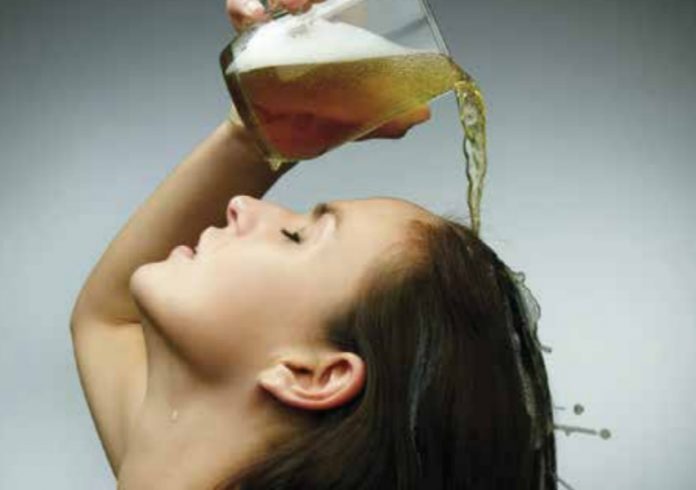SHOULD YOU DRINK THE BEER OR SHAMPOO WITH IT — OR BOTH?
Beer: You can bathe in it, fertilise grass, and cook with it. But have you ever doused your hair with it? (We mean on purpose, not the accidental, “Hey, I’m doing a ‘keg stand’ and my hair got in the way” kind.) Turns out beer just might be good for your hair, too.
Beer’s most basic ingredients — malt and hops — are full of protein that can strengthen hair cuticles. The cuticle is a layer of dead cells wrapped in a shingle-like fashion around the outermost part of the hair shaft. When the cuticle is damaged, these cells are raised and rough.
If you apply the proteins found in beer to your hair, the cuticles begin to realign themselves orderly. Essentially, the proteins repair damage to your hair caused by all the other things you may do to make it look good: blow-drying, straightening, curling and colouring.
The beer benefits don’t end with stronger locks; it can make your hair shinier, too. As the proteins bind with hair cuticles, the newly smoothed surface will better reflect light. This means your hair will become shinier. The alcohol in beer also adds shine, thanks to B vitamins and natural sugars, although some experts caution the alcohol will cause dry hair if you use it too often. Critics also claim there’s no evidence that beer is a wonder-rinse; it won’t make hair grow and can leave behind a “just left the frat party” smell.
To use beer as a hair rinse, mix it at room temperature (about a quarter of a cup or 59 millilitres) with equal water and add two tablespoons of apple cider vinegar to cut the beer smell. After using shampoo and conditioner, saturate hair with the beer rinse and let it soak for a few minutes before rinsing. While too drying to use every day, a once- or twice-monthly beer rinse will work as well as a pricey clarifying shampoo, removing buildup from hair products.
For a leave-in conditioner, transfer the mixture to a spray bottle, spritz and go. As the proteins in beer bind to the hair shaft, something fabulous will happen, volume. For people with fine, thin hair, a solution that delivers volume is the Holy Grail of hair products.
Unfortunately, the volume boost beer offers your tresses will only last as long as the beer remains bound to hair follicles. Wash it out, and the benefit goes down the drain, too. Re-applying a leave-in beer treatment when you wash your hair will make it feel like a more long-lasting benefit.
You also can turn your next beer into a shampoo. Reduce a cup (236 millilitres) of beer over medium heat until there’s only one-quarter cup left (you’ll have boiled off the alcohol). After the beer reduction cools, mix it with a cup of shampoo, rebottle it and wash as usual.
HOMEMADE HAIR AIDS
- New hair-care products excite everyone, but you can save money and get good results from these homemade products. Give them a try:
- Repair damaged hair by treating it with oil and egg yolk—massage olive oil into the hair. Then beat the yolk of 1 egg and massage it into hair, working from the ends up. Leave on for 10 minutes, then shampoo as usual. Do this once a week for a month, and your hair should begin to feel healthier.
- Condition your hair by applying mayonnaise before shampooing. Apply to dry hair and let sit for 1/2 hour, then rinse and shampoo as usual.
- For a lemon rinse, blend 1/2 cup of strained lemon juice and 1 cup of distilled water in a bottle. Comb the liquid through your hair after each shampoo.
- Rub baby powder into your hair and then brush it out thoroughly for a quick, dry shampoo.
Whether you have an artificial hair colour that needs refreshing or you want to enhance your own shade naturally, customised herbal rinses add highlights or depth and are gentle on your budget. If you want to experiment with customising herbal rinses, there’s no real risk because their effect is subtle. However, avoid acidic fruits and vegetable colours. Do not use lemons or beet juice, for example. These are very unpredictable over time and are greatly affected by sun exposure. Lemon juice and the sun might make you blonder the first time you try it, but after several treatments, your hair colour will look like the rings of a tree trunk — in several shades.
